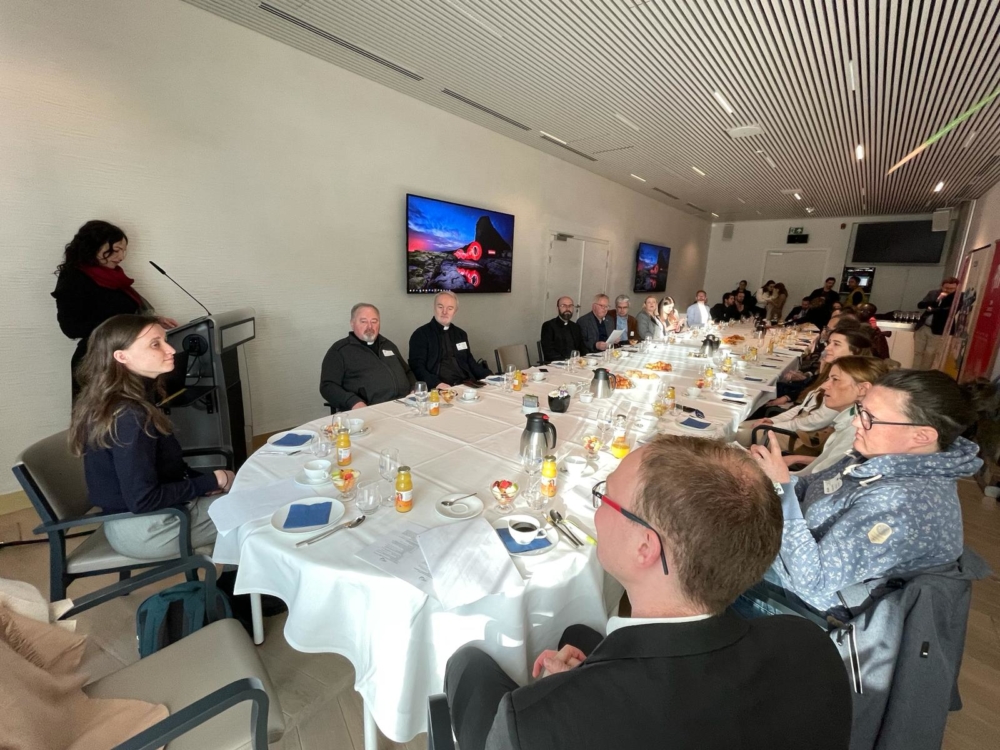Brussels, 10th April 2024
The European Sunday Alliance organised a breakfast seminar this morning with MEPs, Commission representatives, trade unionists, policy experts, and faith-based advisers. The meeting was entitled The Importance of ‘Sunday Protection’ in EU Policy Initiatives On Mental Health and Loneliness. This European Parliamentary Breakfast, hosted by Miriam Lexmann MEP (EPP) and Tomáš Zdechovský MEP (EPP), was held in support of the European Sunday Alliance campaign.
The European Sunday Alliance invited the stakeholders to discuss the role of synchronised free time as an antidote to mental health issues and loneliness. MEP Miriam Lexmann (Slovakia), who has long been supporting the Alliance and acts as its sponsor, gave opening remarks together with MEP Tomas Zdechovsky (Czech Republic), who co-hosted the event.
FAFCE’s most recent board resolution focused on this very topic, declaring that “families are the best allies for young people” in the context of the mental health crisis. The resolution called on European institutions and member states to “promote a culture of life, solidarity and community, that can help the youth in fostering trust in the future, while coping with economic, social and cultural obstacles”. Moreover, it called institutions to “recognise the role of civil society, particularly families and family networks and associations”.
Reiterating its support for the European Sunday Alliance, FAFCE used the resolution also to repeat its demand to “establish the Sunday as a weekly day of common rest, thus favouring family and social cohesion.”
Béatrice d’Hombres, Project Coordinator of ‘Fairness and Loneliness’ from the European Commission emphasised the role of a work-free Sunday in fostering social connections across generations. We have a special duty to encourage intergenerational solidarity, as “loneliness is higher among young people”, according to d’Hombres.
European Commission data that she provided showed that 73 percent think that individuals and families play a major role in supporting lonely individuals. While social connections are a way to combat loneliness, d’Hombres identified the need for synchronised time: “people need to have a space but also time to meet.”
She focused also on the role of ideological polarisation as an exacerbating factor of our culture of loneliness. Church activities, volunteering, charity, community – connecting people contributes to the sense of belonging and addresses loneliness, she suggested.
Stefan Eirich, President of the German Catholic Workers’ Movement, linked the rise in loneliness to a decline in empathy. He described the phenomenon that the more lonely people are, the less empathy they are able to have, and the less they empathise with the vulnerability of others.
Antonella Sinagoga, Expert on Parish and Family from the Salesian Youth Ministry Department, advocated for synchronised free time to support families. This is particular pertinent in tackling the mental health crisis among young people.
Hendrik Meerkamp, Senior Policy Adviser at the European Confederation of Independent Trade Unions, said that loneliness is worth fighting against. Ensuring a common rest day is the way to allow families and communities to spend quality time together.
Speakers at the meeting included:
MEP Miriam Lexmann (EPP)
Member of the European Parliament Committee on Employment and Social Affairs
MEP Tomáš Zdechovský (EPP)
Member of the European Parliament Committee on Employment and Social Affairs
Béatrice d’Hombres
Project Coordinator ‘Fairness and Loneliness’ at the European Commission
Stefan Eirich
President of the German Catholic Workers’ Movement (KAB)
Antonella Sinagoga
Expert on Parish and Family for the Salesian Youth Ministry Department
The event’s moderators were:
Franziska Kuster
Judicial Adviser at the Protestant Church in Germany (EKD)
Hendrik Meerkamp
Senior Policy Adviser at the European Confederation of Independent Trade Unions
(CESI)
Maria Waszkiewicz
Project Manager at Federation of Catholic Family Associations in Europe (FAFCE)
Alix de Wasseige
Policy Adviser at the Commission of the Bishops’ Conference of the EU (COMECE)
What is the European Sunday Alliance?
FAFCE is an active member of the European Sunday Alliance, a broad network of more than 100 national Sunday alliances, trade unions, employers’ organisations, civil society organisations, churches and religious communities working to raise awareness of the unique value of synchronised free time for our European societies. Read more about FAFCE’s commitment to the European Sunday Alliance campaign.
FAFCE also thanks the following MEPs across parties who have lent their support to the Alliance on social media channels recently, including: Brando Benifei (S&D, Italy), Gabriele Bischoff (S&D, Germany), Katrin Langensiepen (Greens/EFA, Germany), Dragos Pislaru (Renew, Romania), Dennis Radtke (EPP, Germany), Evelyn Regner (S&D, Austria), Michaela Sojdrova (EPP, Czech Republic) and Tomas Zdechovsky (EPP, Czech Republic) – and, as sponsor of the European Sunday Alliance, Miriam Lexmann (EPP, Slovakia).
In March, Vincenzo Bassi, FAFCE President, said: “The worst sickness for the family today is loneliness. That is why supporting the European Sunday Alliance in achieving a work-free Sunday is so crucial. Family networks are key in the fight against this loneliness crisis.
However, it is essential that these family networks are giving the opportunity of quality time. When the family has time, they can open up the family to their networks and to their communities. It is only if we recognise the importance of time that we can begin to say that we put families at the centre of our communities.”








